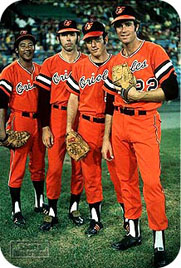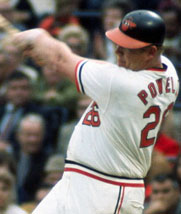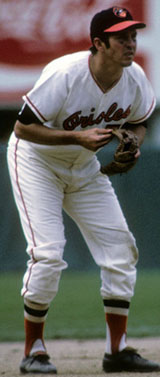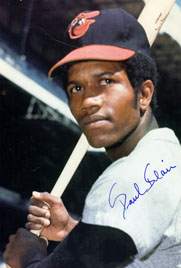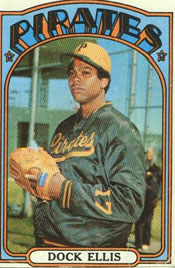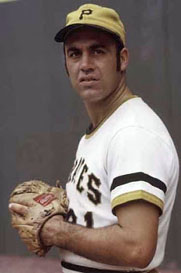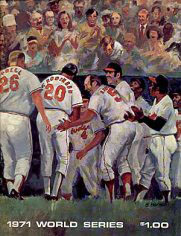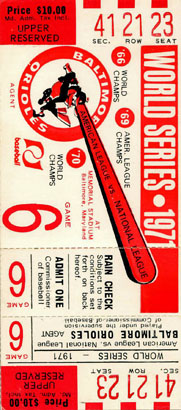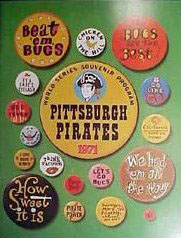1971 - Game 7: Pittsburgh Pirates @ Baltimore Orioles
|
|
Pennant Races
The Baltimore Orioles had replaced the New York Yankees as the American League's resident dynasty.
- The Orioles won the World Series in 1966, sweeping the Los Angeles Dodgers.
- They put together a Yankee-like domination in the years 1969-70-71, appearing in the Fall Classic every season.
- After being upset by the Miracle Mets in 1969, Baltimore had defeated the Reds in five games in 1970.
Manager Earl Weaver made no secret of his philosophy: good pitching and defense and the three-run homer.
- His '71 club included four 20-game winners. In order of ERA, they were:
RHP Jim Palmer 20-9, 2.68
LHP Dave McNally 21-5, 2.89
RHP Pat Dobson 20-8, 2.90
LHP Mike Cuellar 20-9, 3.08
- The quartet accounted for all but 20 of the Orioles' 101 victories.
- The Birds led the AL in both ERA and runs scored. They finished just three behind the Red Sox in HRs (168 to 171).
- While no regular hit over .300, the O's lineup included five batters with 18 or more HRs: RF Frank Robinson (28), 1B Boog Powell (22), 3B Brooks Robinson (20), CF Don Buford (19), and 2B Davey Johnson (18).
- If up-the-middle defense is the backbone of a team, the Orioles were in good shape with their pitching, DP combo of Mark Belanger at SS and Johnson at 2B, along with CF Paul Blair, who could go get 'em with anyone. And Brooks was the standard by which all third basemen were judged when it came to fielding.
- Baltimore ran away with the AL East, outpacing the Tigers by 12 games.
- Then they swept the upstart Oakland A's in the ALCS.
The NL produced its fourth different pennant winner in as many years.
- The Pirates rose to the top for the first time since 1960.
- After outdistancing the Cardinals by seven games to take the NL East, the Bucs ousted West champion San Francisco in four games.
- Like the Orioles, the Pirates led their league in runs. They also topped the Senior Circuit in HRs by one over the Atlanta Braves.
- The Bucs' leader was the only holdover starter from the '60 champions, Roberto Clemente. The 36-year-old RF hit a team-high .341 and also led the club in doubles with 29. And no one challenged his arm from RF.
- The slugging leader was Willie Stargell, who led the NL in HRs with 48, one more than Hank Aaron of the Braves. Willie finished second to Joe Torre of the Cardinals in RBI with 125.
- C Manny Sanguillen hit .319 and contributed 81 RBI, behind only Stargell and Clemente in that department.
While Clemente was undoubtedly the best player on the '71 Pirates and a father-figure to his teammates, the players considered Sanguillen the second best. If it weren't for Hall of Famer Johnny Bench, who overshadowed him, Sangy's clutch hitting and impressive defense would have been noticed more at the time and after his retirement.
- Pittsburgh ranked only fifth in the league with an ERA of 3.31. They had an almost 20-game winner in Dock Ellis (19-9). Another righty, Steve Blass, led the starters with a 2.85 ERA in compiling a 15-8 record.
- Unlike the Orioles, who didn't need their bullpen very much, the Pirates boasted an outstanding relief corps led by Dave Giusti and his 30 saves.
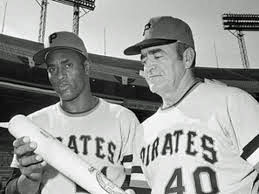
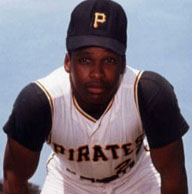
L: Robert Clemente and Danny Murtaugh; R: Al Oliver
September 1, 1971, saw a baseball first. Pirates skipper Danny Murtaugh fielded a lineup that included no white players.
Al Oliver, an African-American outfielder on the '71 Pirates, recalled the spirit on the club. There was no question that Roberto Clemente was our leader. Undeniably, the Latin American players brought the love of the game, an enthusiasm, and they played the game loosely. To this day, I love watching the Latinos play because they remind me of the Harlem Globetrotters on a baseball field. They're having fun, and that's how the game should be played.
The Pirates credited their Irish-American manager with molding the disparate group into a team. Dave Cash: Murtaugh was a player's manager. He knew the psyche of each player. He handled them perfectly and was a student of the game.
New York sportswriter Jimmy Cannon described the Pirates during the 1971 season this way: It was a cranky team under Harry Walker and Larry Shepard. Guys didn't get along. They complained and split into grumbling factions. But Murtaugh appears to have straightened them out. The tension isn't obvious anymore. They don't talk as if they were dissatisfied.
Dock Ellis told Sport magazine during the season: Murtaugh's a beautiful dude. Beautiful. Winning. That's all he cares about. Nothing else. Screw up, you hear about it. Black or white.
Although Danny hailed from an older, more conservative generation and did not care for their long hair, large Afros, and "mod" clothing, he allowed his players to express themselves in those ways as long as they respected his authority, played hard, and dedicated themselves to the betterment of the team. The Orioles entered the Series as 8-to-5 favorites.
- It was hard to argue otherwise. If pitching was 70% of baseball, the Orioles could match up with anyone.
- The only storm cloud on the horizon for Weaver's bunch was the status of Powell, who had torn muscle fibers in the back of his right hand. Despite Boog's skipping batting practice for two days before the Series, Earl insisted Boog would play. He may have to come out, but he's starting.
- NBC paid a reported $17.5M per year for TV rights to the series, division playoffs, and the All Star game as well as 35 regular season games. That package included the first night game in Series history Wednesday, October 13.
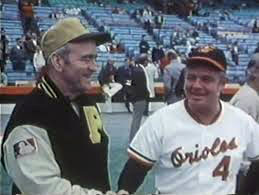
Danny Murtaugh and Earl Weaver Series Results
- Saturday, October 9 @ Baltimore: Orioles 5 Pirates 3
WP: Dave McNally; LP: Doc Ellis
- Sunday, October 10 @ Baltimore: Orioles 11 Pirates 3
WP: Jim Palmer; LP: Bob Johnson
- Tuesday, October 12 @ Pittsburgh: Pirates 5 Orioles 1
WP: Steve Blass; LP: Mike Cuellar
- Wednesday, October 13 @ Pittsburgh: Pirates 4 Orioles 3
WP: Bruce Kison; LP: Eddie Watt
- Thursday, October 14 @ Pittsburgh: Pirates 4 Orioles 0
WP: Nelson Briles; LP: McNally
- Saturday, October 16 @ Baltimore: Orioles 3 Pirates 2 (10 innings)
WP: McNally; LP: Bob Miller
The Orioles jumped out to a 2-to-0 lead in games, outscoring the Bucs 16-6.
- But Steve Blass stemmed the tide in a must-win situation back in Pittsburgh with a masterful three-hitter.
- That gave Pittsburgh momentum to sweep the three games at home.
- The Orioles continued the trend of home team victories in Game Six.
- Discussion centered around the 9,000 empty seats for Game Six, with Orioles management announcing 10,000 seats were still unsold for the finale.
Game 7: Sunday, October 17 @ Memorial Stadium, Baltimore
After using three of his 20-game winners in Game Six, Earl Weaver had no choice but to start the remaining one, Cuellar, in Game Seven.
- Earl said he would take from Cuellar what he got in the third game when Mike allowed only two runs for the first six innings.
- Murtaugh countered with Blass to set up a rematch of Game 3. I guess this will be my biggest game, said Steve, belaboring the obvious. I still have a chance to win the car (the MVP Award).
- The Pirate skipper summarized the series succinctly. We bounced back after we lost the first two games, and they bounced back after losing the next three. Now there are no more bounces. The next one tells it all. And he added the age-old Game Seven refrain. Everybody - Dock Ellis included - will be in the bull pen except Blass. He was referring to the biggest winner on the staff who gave up four runs in 2 1/3 innings in Game One and did not start again.
- An Orioles victory in the franchise's initial seventh game would mark the first time in Series history that the home team won every game.
|
Pittsburgh Lineup
| Dave Cash |
2B |
| Gene Clines |
CF |
| Roberto Clemente |
RF |
| Bob Robertson |
1B |
| Manny Sanguillen |
C |
| Willie Stargell |
LF |
| Jose Pagan |
3B |
| Jackie Hernandez |
SS |
| Steve Blass |
P |
|
 |
 |
Baltimore Lineup
| Don Buford |
LF |
| Davey Johnson |
2B |
| Boog Powell |
1B |
| Frank Robinson |
RF |
| Merv Rettenmund |
CF |
| Brooks Robinson |
3B |
| Ellie Hendricks |
C |
| Mark Belanger |
SS |
| Mike Cuellar |
P |
|
|
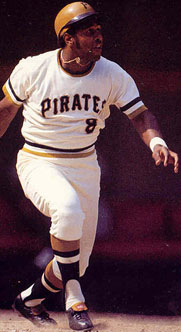
Willie Stargell
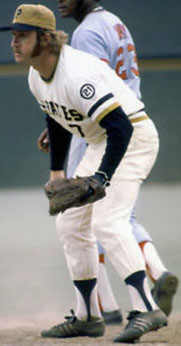
Bob Robertson
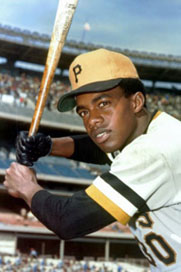
Dave Cash
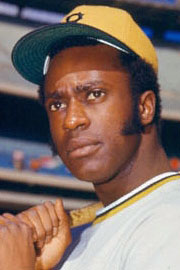
Gene Clines
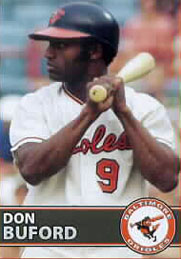
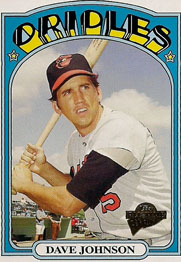
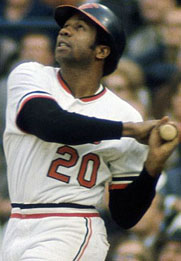
Frank Robinson
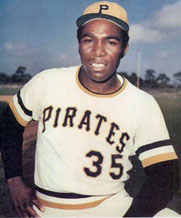
Manny Sanguillen
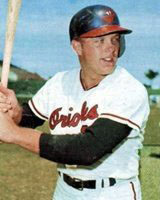
Merv Rettunmund
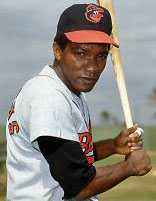
Elrod Henricks
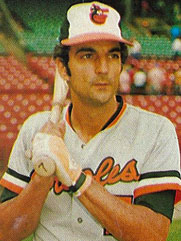
Mark Belanger
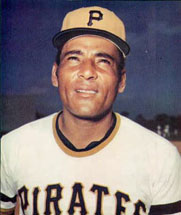
Jose Pagan
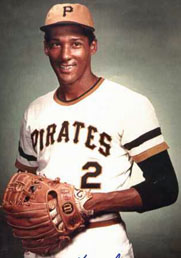
Jackie Hernandez
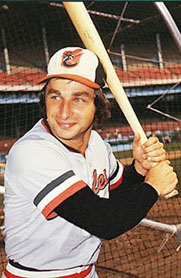
Tom Shopay
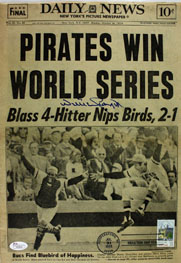
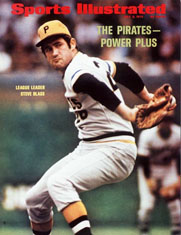
Blass on cover of Sports Illustrated
|
An overcast, windy Sunday afternoon brought 47,291 (about 6,000 short of capacity) to Memorial Stadium.
1st inning
- Dave Cash (4-for-26, .154) bounced to 3B Brooks Robinson.
Gene Clines (.141) hit the first pitch to CF Merv Rettenmund in LCF.
The Pirates' best Series hitter at .440 (11-for-25), Clemente hit a high bounder to SS Mark Belanger.
- Don Buford (.250 in the Series), the Orioles' walk leader for the third year in a row, worked a full count pass.
Next came the Oriole the Pirates considered the most underrated, Davy Johnson. The 2B tried to drop a bunt down the 3B line but popped to Blass.
Boog Powell (3-for-23, .180 with only one RBI) saw nothing but slow curves from Blass. With the count 0-2, Weaver bolted out of the dugout to complain that Blass was not in contact with the rubber when delivering the ball. Earl also complained that Blass was going to his mouth too often. The umpires gathered around the mound and cautioned the hurler. Blass, working from the extreme 1B end of the rubber, struck out Powell on a 3-2 curve.
Weaver later said he did not complain in order to rattle Blass but did so because what the hurler was doing was wrong
When asked about the incident after the game, Steve gave a surprising answer. It's a legitimate complaint. For 12 years, I've been pitching that way with my front foot off the rubber, but this is the first time it was called. I know Weaver is right 'cause it's in the rule book. I didn't look it up, but Murtaugh told me, and he's been in the game a few years.
Frank Robinson, who scored the winning run in the bottom of the 10th in Game Six, lined the first pitch toward the RF corner but Clemente tracked it down.
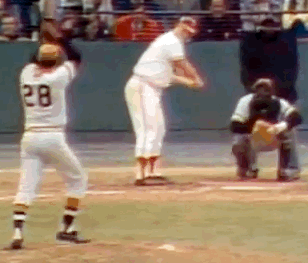
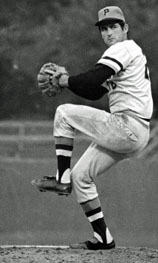
Blass pitches to Powell. Both pictures show Steve's right foot
at the 1B edge of the rubber.
2nd inning
- Robertson bounced the first pitch to Brooks Robinson.
Sanguillen, who hit .345 against lefties during the regular season, grounded a curveball to Brooks, who took it off his chest, picked it up, and threw out the fleet C.
Willie Stargell (4-for-20) went down swinging on three straight fastballs.
- Rettenmund (5-for-23, .217) went out 6-3 on the first pitch.
Brooks Robinson (7-for-20, .350), having another good Series after being the defensive star and MVP in 1970, walked. That gave Blass as many walks, two, as he issued in the entirety of Game 3.
Elrod Henricks (3-for-16, .188) bounced the ball toward Robertson, who couldn't handle the short hop. Fortunately, 2B Cash was behind him and retrieved the ball in short RF to hold Robinson at 2nd.
Belanger hit the first pitch up the middle. Cash speared the grounder just to the right of the bag, stepped on 2nd, and threw to 1st for the Pirates' seventh double play of the Series.
3rd inning
- Jose Pagan (3-for-12, .250) fell behind 0-2, then bounced to Robinson.
Jackie Hernandez (4-for-15) tried to bunt the first pitch but tipped it into his feet in the batter's box. He got hold of an 0-2 pitch and lined to Frank Robinson in RF.
Blass drew some boos as he stepped in. The grounder to 2nd completed Cuellar's perfect trip through the order.
- Cuellar struck out.
For the second straight at-bat, Buford took Blass to a full count before getting on base, this time with a liner into RCF. Clemente sprinted over and held the speedy leadoff man to a single.
Before Blass delivered the first pitch to Robertson, Buford took off for 2nd, but Blass threw to Robertson, who relayed to Cash for the putout.
Johnson grounded right down the 3B line, but Pagan, playing right behind the bag, threw him out easily.
Blass was a nervous wreck during the game. I could hardly stand still, he recalled. I kept coming back to the clubhouse between innings, and I must have opened seven Cokes, but I didn't drink any.
4th inning
- Cash hit a soft liner to Johnson.
Clines dropped a bunt in front of the mound. Cuellar hurried in, whirled and threw low to Powell, who dug the ball out of the dirt in front of the runner.
Cuellar started Clemente with a high looping curve that Roberto hammered over the LCF wall. The Pirates exploded off their bench to greet their leader.
After the game, Clemente revealed a pregame event that motivated him. You know I get along very well with the other players who play this game, and today I receive a telegram from Wes Parker of the Dodgers. You know what the message says? It says, "Roberto, do it for your parents." You cannot know what this mean to me. My father, he is 91. My mother, 87. I love them so much. This is mostly for them.
Roberto also took special pleasure in clouting the HR off Cuellar. Clemente had managed Cuellar in the Puerto Rican Winter League the previous offseason. The pitcher had annoyed his skipper with his lack of conditioning and his refusal to throw specific pitches to certain hitters. When Roberto attempted to discipline him, Mike left the team.
Robertson bounced to Brooks's left and was thrown out.
Pirates 1 Orioles 0
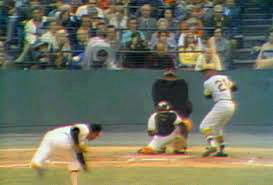 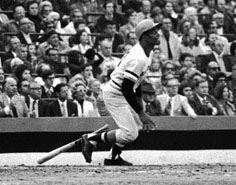
Cuellar delivers the fateful pitch to Clemente, who admires his blast.
- With the Pirates overshifting on him, Powell grounded to Cash's left and was tossed out.
Frank Robinson whiffed on an 0-2 slow curve.
Rettenmund hit a roller that Pagan took on the run to his left and threw to 1st.
5th inning
- Sanguillen, the toughest Pirate to fan but also having drawn only six unintentional walks all year, timed a 1-2 slow curve for a liner into CF.
Pitching from the stretch for the first time, Cuellar fell behind Stargell 3-0 but came back to strike him out for the second time.
Belanger went into the hole for Pagan's high bounder, leaped and threw to 2nd to just nip Sanguillen at 2nd.
Throwing more fast balls than he did in Pittsburgh in Game 3, Cuellar fanned Hernandez.
- Brooks hit an 0-2 fastball weakly to Clemente.
With the Pirates shifted and SS Hernandez directly behind 2B, Hendricks drove a double into the RCF gap.
Belanger smacked the first pitch to Clines in CF. The runner held 2nd.
Blass fell behind 0-2 to his fellow moundsmen before getting Cuellar looking.
6th inning
- Blass tapped back to the mound.
Cash became Cuellar's fourth strikeout victim.
Working fast the way pitching coach George Bamberger liked it, the 34-year-old Cuban also fanned Clines on a changeup.
- Buford had reached base six times in his last seven trips. For the third straight time, he reached a full count. Then he flew to CF.
Brooks popped to Hernandez on the first pitch.
Powell fanned on a slow curve.
7th inning
- Clemente had hit safely in every game of a seven-game series for the second time. Hank Bauer was the only other player to do that. Roberto lined out to CF on the first pitch.
Robertson struck out on a screwball.
Sanguillen flied to right on the first pitch.
- Frank Robinson tried to check his swing, but the ball looped to Cash.
Rettenmund bounced a 3-2 pitch to Hernandez.
Brooks hit the first pitch to Hernandez for another easy out at 1st.
8th inning
- Stargell, who had looked bad his first two at-bats, stroked a hard grounder that just got past Belanger, who couldn't quite reach the ball moving to his right from his spot behind 2B in the Orioles' shift.
With the Orioles expecting a bunt, Murtaugh instead flashed the hit-and-run sign to Stargell. Pagan got hold of a high curveball and drove a double to the LCF wall. Playing shallow, CF Rettenmund followed the scouting report on the hitter and broke toward RF when he saw Stargell take off with the pitch. Then he fumbled the ball momentarily as it bounced off the wall before throwing it in. Stargell slid into home as Powell cut off Belanger's relay that looked like it had a chance to nip the runner.
Asked afterwards if Powell made a bad move, Weaver replied emphatically. No. The run would have scored anyway. C Hendricks also defended his teammate. I think Boog made a wise decision.
Weaver visited the mound but left Cuellar in as righty Eddie Watt and southpaw Pete Richert worked in the bullpen.
When Hernandez flew to Robinson in RF, Pagan didn't test Frank's throwing arm.
Blass bounced to the mound.
Pagan died at 2nd as Cash went out 5-3, Powell again digging out a low throw.
Pirates 2 Orioles 0
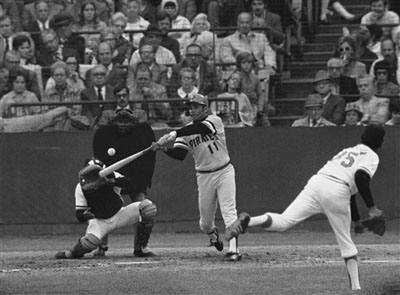
Pagan smacks double to drive home 2nd run.
- Hendricks broke Blass's string of retiring eight in a row with a ground single just to the right of shifted SS Hernandez.
With the crowd finally alive, Belanger lined up the middle just onto the outfield grass to put runners on 1st and 2nd.
Luke Walker and closer Dave Giusti started throwing in the Pirates pen.
Tom Shopay, batting for Cuellar, took two pitches, then bunted the runners over, 1-4, as Blass ignored Sanguillen's shout to throw to 3rd.
The extra run in the top of the inning allowed Murtaugh to keep his infield back to avoid a two-run hit.
Buford grounded straight to Robertson, hugging the line behind the 1B bag. Hendricks scored, and Belanger moved to 3rd.
With the tying run on 3rd, Blass was so nervous he couldn't stand still. He circled the mound before returning to the rubber.
With the tying run 90' away,
Johnson hit a grounder to deep short that Hernandez handled flawlessly.
Following the scouting reports that said Davey pulled the ball, Hernandez moved a few feet toward 3rd. Jackie had gained such confidence in his fielding that he wanted the ball hit to him.
Pirates 2 Orioles 1
Blass was so nervous he couldn't watch his mates bat in the top of the 9th. He went to the clubhouse and threw up. He was so psyched up, he couldn't stand still.
9th inning
- Pat Dobson took over the pitching chores.
Belanger took a bad hop grounder off the bat of Clines behind 2nd and threw to 1st.
With a chance to tie a World Series record of 13 hits, Clemente struck out on a 3-2 curve.
Robertson lined a full count delivery into LF for the Pirates' fifth hit.
Sanguillen showed hs speed by beating out a slow roller to Robinson. It was Manny's 11th hit.
Weaver brought in lefty Dave McNally to face Stargell. That made it two games in a row that Earl had employed three 20-game winners.
Willie hit the first pitch on the ground to Johnson, who tossed to 1st to end the threat.
The Pirate hurler admitted later that he was scared to death as he took the mound to get the last three outs of the World Series. He had to force himself to go up the steps of the dugout and out to the mound. He decided he would throw strikes and hope for the best.
- Blass would have to retire the 3-4-5 hitters in the Orioles order.
Amazingly for 21st century fans, Murtaugh had no one warming up.
Blass continued to feed Powell slow curves. With the crowd yelling Charge!, the big 1B tagged a 1-1 pitch down the RF line only to see it twist foul. Boog bounced the next pitch to Cash.
Frank Robinson popped the first pitch to Hernandez in short LCF.
Rettenmund grounded the 0-1 pitch, Blass's 108th, to Hernandez, who threw from behind 2nd for the final out of the Series.
Coming into the Series, Hernandez's fielding had been compared unfavorably to his Oriole counterpart, Belanger. But Jackie played errorless ball throughout the seven games. He said afterwards about the final out: I didn't care where they hit the ball. I just wanted it to be to me.
FINAL: PIRATES 2 ORIOLES 1
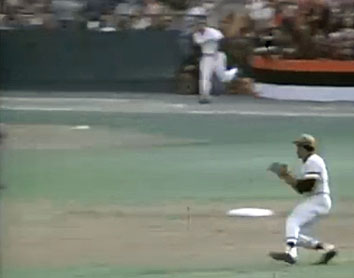
Hernandez grabs the final grounder.
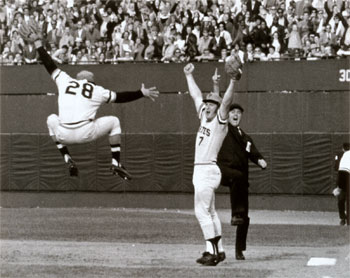
Blass leaps in exulatation after final out.
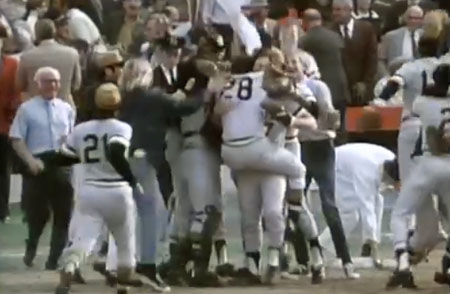
Pirates celebrate!
|
The press voted Clemente the MVP of the Series for hitting safely in every game, compiling a .414 average with two doubles, a triple, and two homers. And that's not to mention his fielding, throwing, and baserunning.
Postgame
Pirates Clubhouse
- Murtaugh had a phone call waiting for him when he reached his office in the visiting locker room. It was from President Richard Nixon, the nation's Sports Fan in Chief. With reporters taking notes, the conversation went like this:
This is the President, Congratulations.
Thank you, Mr. President.
It was kind of hectic, wasn'it it?
Yes, I chewed four packs of tobacco today in the dugout.
Blass pitched quite a ballgame.
Yes, he did a tremendous job out there today.
Blass and Clemente were great, but it really was a team effort.
Yes, Mr. President.
Congratulations, again.
When he hung up, Murtaugh told reporters: That four packs of tobacco just tied a record, by the way.
- Blass was interviewed by Pirates broadcaster Bob Prince for national TV. I don't know what to say, Steve told Bob. The biggest thrill that could ever happen. A skinny kid from Connecticut.
Any moments when you were really worried? asked Prince.
There were several. One was a hanging slider to Davey Johnson, but he missed the pitch. I can't believe it! How many people have this kind of opportunity?
After Prince was finished with him, Blass came into the manager's office and hopped on Murtaugh's desk. You don't mind if I use your desk, do you? No, not at all, replied Danny. First of all, I want to say I'm happy to be part of our no-20-game winner pitching staff. We don't have any spectacular pitchers, only pitchers with a lot of experience. We have a no-name pitching staff, but I imagine it will have a name now. Asked to compare this day to others in his life, Blass replied: You've got to be kidding. The only way to top this is for me to jump off Monongahela River bridge. Explaining why he moved towards the play every time the ball was hit, he said, I was trying to get everybody out myself. I was a nervous wreck.
After getting hit hard in his two starts against the Giants in the NLCS, Blass had a talk with himself. I knew I had to forget about the pressure of the World Series and concentrate on the game. I was afraid if I let it get the best of me, I'd be a physical wreck and embarrass myself and my teammates. From that standpoint, the World Series was actually easier for me.
Then he answered a call from the Governor of Connecticut, his home state.
- Murtaugh resumed: There was more pressure in the third game because, if we had gone down three games, it would have been nearly impossible to come back.
- The Pirates manager, who turned 54 during the series, was asked about his future.
After the 1964 season, he relinquished the job because of a heart condition. He did scouting for the club before returning as manager in 1970. On May 20, 1971, Danny was admitted to a hospital in Cincinnati with chest pains. He returned to the dugout June 6.
He promised to let everybody know his decision in three or four weeks. The outcome of this World Series will have absolutely nothing to do with my decision. I'm going back home, and I'm going to relax three or four weeks, play a little golf with my buddy, Mickey Vernon. I'm going to do a lot of thinking about the future, and I'll base my ultimate decision on what's best for me and my family. Nothing else will influence me.
Murtaugh again moved into the front office for the '72 season but, late in the 1973 season, GM Joe Brown asked him to take over as manager for a fourth time. Danny finally stepped down for good following the 1976 season.
- On national TV during an interview with NBC's Bob Prince, Clemente asked to say something in Spanish. What he said translated to: On the most important day of my life, I extend a blessing to my boys and ask my parents to give me their blessing. Talking to the press a short time later, the Pirates RF got a lot off his chest. For the first time in his 17-year major league career, he finally felt that his talent was universally recognized. Now people in the whole world know the way I play. I will be a completely different person. For the first time, I have no regrets. ... This is what I want people to know. How I play, not that I am a hypocondriac ... The writers say I am a .300 hitter, but I can't pull the ball. It's always "but" or some other sarcastic thing. They never want to give me credit. ... He referred to the saying that the worse Clemente feels, the better he plays. That is supposed to be funny, but it is nonsense. I play a million games with bad flu and the fever. How does anyone now? I play with hemotoma on my leg right now. Do they think my bad back is a fake? I don't worry about pain. I play the way I do because that is me. ... I am very tired. I don't play for myself. I'm happy we won because of the effort of this team has made all year and for the Pittsburgh fans. This is not only me; it is a team effort. ... I wanted to show people that the Roberto Clemente who swings bad in the playoffs against Cincinnati last year is not the real Roberto Clemente. I was hurt and couldn't swing the bat. I wanted to finish what we started last year.
- Willie Stargell was asked to rate Clemente. If he is not the best, he is one of the all-time best. His fantastic desire to perfection makes everybody who plays with him do their bery best always. I've played beside him nine years, and nobody else does everything as well as he does. And everyone of us uses his wisdom and example.
When asked the same question, Murtaugh replied: Roberto Clemente is the greatest all-around player I have seen in a lifetime in baseball.
- Roberto was asked how it felt to have people speak of him as the greatest ballplayer today. I feel great, but I feel greatest that we win this game. The best player thing is nice, but it comes second. This must mean much more than when we won it in '60. How do I know how long I can keep going? I am 37. This might be my last World Series. Asked if he might play another five or six years, as GM Brown predicted, Roberto replied, You must be kidding, man. I have to kick myself in the butt all the time to play every day now. I'm a 37-year-old man. If I tell you I do not sleep a wink all night before the game Saturday, will you believe me? Only my wife knows. I know what these last two games mean. I told this club I would lead them. How could I let these people down? I lie awake and I tell my wife, "I got to play real good. I got to be careful and conscious of everything I do. I know what I am made of. I am human, but I don't get excited about a big series."
Clemente would play 102 games in 1972, batting .312 and driving in 60 runs.
He would die that New Year's Eve in the crash of a cargo plane carrying relief supplies to the victims of an earthquake in his native Puerto Rico.
- Bill Mazeroski, the hero of the 1960 World Series but relegated to one pinch-hit appearance in this Fall Classic, sat forgotten in the training room with a big bottle of champagne. Suddenly, his face lit up. I was the inspirational leader, he laughed.
Orioles Clubhouse
- Weaver was asked to go to the Pittsburgh locker room to congratulate Murtaugh but declined. Danny knows I wish him the best, and I'll let these fellows carry the message. He did one helluva job, and I might spoil their celebration if I go over there. Why go over and make them feel bad by seeing me sad.
He waxed philosophical on the defeat. It's not the worst thing that ever happened. The sun's gonna come out tomorrow. It might even be a nice day in Baltimore. I'm proud of my ballclub. I'm proud of myself. I'm proud of what we did. I don't know what more we could've done. Blass just couldn't have been better. Clemente was great, but without Blass they wouldn't have won. My man Cuellar was pretty great, too.
Earl interrupted the interview to take a phone call from President Nixon. After listening for a while, Weaver said, Mr. President, this means much more than if we'd have won. After a brief silence, Earl told the chief executive, We're proud to represent the United States. We may not go there as world champoins, but at least we're champions of the American League. What's that? Yes, I'll tell the fellows right away. After hanging up, Earl told reporters the president told him he was proud of the way we played and was proud to have us represent the United States in Japan. He was referring to the team's imminent trip for a series of exhibition games against Japanese teams.
Earl went into the locker room and told his silent players what the president said. Then the intrepid manager hollered, Get it up. Aren't we gonna win 100 games next year and become the first team to ever do that?
He got no response from his glum players. But soon they were chatting, even joking with each other.
When the skipper continued with the press, he repeated his praise of the winning P. Blass couldn't have been better. He didnt get stronger late in the game, but he sure didn't get much weaker.
On his complaint about Blass's foot being off the rubber: I don't know how that could have heped him. But if it did, I wanted to take that advantage away from him and have him play by the rules. If he had walked himself out of the game, I'd say I did something. But I can't now. ...
This isn't as tough to take as losing to the New York Mets (in 1969). Pittsburgh didn't beat us four straight, and this one went seven games instead of five.
Surprisingly for someone not considered a great friend of umpires, Earl praised the crew's work. This was the best umpiring I've ever seen, and it was especially great because of the tremendous pressure they're under in a seven game World Series.
- Frank Robinson: When you lose the Series, everyone seems to forget that you had a great season just to get there. Frank said the turning point in the series came in the fourth game when rookie Bruce Kison held the Orioles scoreless after the first inning.
- Brooks Robinson: They did everything a little better than we did, that's all. Our not winning in Pittsburgh and playing bad there was the difference. Our poor hitting was a combination of both their pitching and our just not hitting like we can.
The attendance totaled 351, 091.
- Each Pirate took home $18,165.
- The Orioles went home with $13,906 each.
The city of Pittsburgh celebrated their heroes' triumph into the wee hours of Monday morning.
- The sanitation department cleaned up tons of debris left by the estimated crowd of 100,000 who jammed the downtown streets. The throng stopped all traffic into the city and cut short a planned motorcade of Pirate players.
- Police made 98 arrests, mostly on charges of drunkenness. But some came from smashing about 20 store windows with a few instances of looting. Four vehicles were overturned. A taxi and a police motorcycle were set on fire.
- Reacting to nationwide condemnation of the behavior of many of his citizens, Mayor Peter F. Flaherty said: While we had an overexuberant celebration after the Pirates' series victory last night, the situation was blown out of proportion by some of the news media. He referred to reports that a dozen women had been raped during the "riot" and that as many as 300 persons had been arrested.
1971 World Champion Pittsburgh Pirates
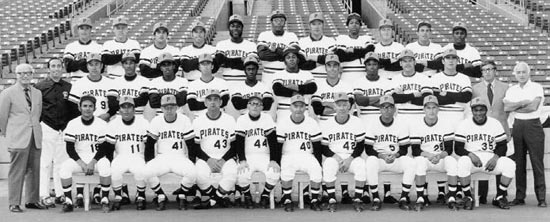 References: The World Series, David S. Neft & Richard M. Cohen (1990)
The Seventh Game, Barry Levenson (2004)
The Team That Changed Baseball: Roberto Clemente and the 1971 Pittsburgh Pirates, Bruce Markusen (2006)
Clemente: The Passion and Grace of Baseball's Last Hero, David Maraniss (2006)
"Pirates of the Caribbean," Danny Torres, Memories and Dreams, Baseball Hall of Fame, Summer 2015
Next in this series: 1972: Oakland @ Cincinnati
|
|











